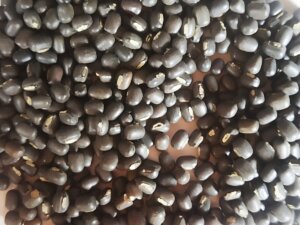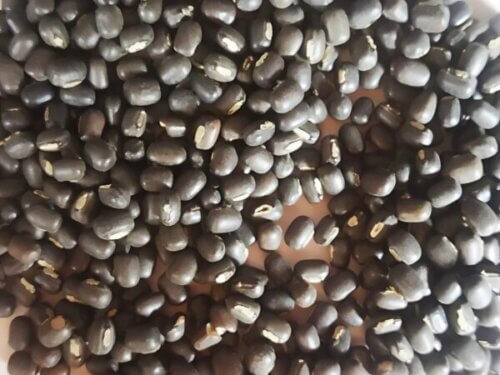Black lentils, often known as beluga lentils, are tiny yet powerful beans. These little beans, with their stunning black colour and strong earthy flavour, provide a nutritious punch that is sometimes missed. Protein, fibre, iron, folate, and other important vitamins and minerals are all found in black lentils.
They are common in a variety of foods across the world, especially in Indian and Mediterranean meals. These versatile legumes may be used in soups, salads, stews, and side dishes, as well as as a meat alternative in vegetarian and vegan recipes. Black lentils, with their particular look and nutritional composition, are not only delicious but also provide several health advantages.

Black Lentils Nutrition
Black lentils are a useful supplement to a balanced diet because they are packed with protein, fibre, and important elements. The following are some significant black lentil nutritional facts:
Proteins
Black lentils are an ideal plant-based source of protein. They provide about 18 grams of protein per cooked cup, which is important for both general health and for the growth and repair of muscles.
Fibre
Each cooked cup of these lentils has about 16 grams of dietary fibre. Fibre helps in maintaining normal blood sugar levels, improves heart health, and helps promote good digestion.
Minerals and vitamins
Black lentils are an excellent source of several vitamins and minerals, such as folate, iron, magnesium, potassium, and zinc. Iron is necessary for the body to transport oxygen, while folate is necessary for cell growth and development. Zinc, potassium, and magnesium all improve general health and well-being.
Iron
Black lentils are a great plant-based supply of iron {6.6 mg (37% of the daily recommended consumption) }, a mineral which helps in the movement of oxygen throughout the body. Iron is required for the maintenance of healthy blood cells and the prevention of iron deficiency anaemia.
Magnesium
Black lentils are high in magnesium, a mineral that is essential for many body activities. Magnesium is essential for maintaining healthy neuron function, bone health, and blood pressure control.
Zinc
Black lentils are high in zinc, an essential element which helps in immune function, wound healing, and cell development. Zinc is also important for keeping healthy skin, hair, and nails.
B vitamins
Black lentils include thiamine (vitamin B1), riboflavin (vitamin B2), niacin (vitamin B3), and folate (vitamin B9). These B vitamins are necessary for energy generation, cognitive function, and the maintenance of healthy red blood cells.
They also contain important amounts of vitamins, such as B6 and K.
Potassium
Black lentils include potassium, an electrolyte that aids in fluid balance, blood pressure regulation, and normal muscle and nerve function.
The estimated vitamin and mineral content of 1 cup (198 grams) of cooked black lentils:
Iron: 6.6 mg iron (37% of the daily recommended consumption)
Magnesium: 71 mg (17% of RDA).
Zinc: 2.5 mg zinc (23% of the daily recommended consumption)
Thiamine (Vitamin B1): 0.3 mg (about 25% of the daily required intake)
Riboflavin (Vitamin B2): 0.2 mg (18% of the daily value)
Niacin (Vitamin B3): 2.2 mg (14% of daily value)
Folate (Vitamin B9): 358 mcg DFE (ninety per cent of the daily recommended dose)
Potassium: 731 mg potassium (16% of the daily recommended consumption)
Carbohydrates: 40 grams per cup, providing a continuous flow of energy and helping with general body functioning.
Phosphorus: 355 mg per cup, required for bone health, cell function, and nutrition metabolism.
Copper: 0.4 mg per cup, has a role in energy generation, collagen formation, and nervous system function.
Manganese: 1.3 mg per cup; antioxidant defence, bone formation, and glucose metabolism are all aided by manganese.
Selenium: 5.6 mcg per cup, which acts as an antioxidant and aids thyroid function and DNA synthesis.
Related: 4 Incredible Natural Sources of Vitamin K to Incorporate into Your Diet
Low-fat content
Black lentils have no cholesterol and are naturally low in fat. They contain vital nutrients and are a healthy option for people watching their fat consumption.
Rich in antioxidants
Antioxidants present in black lentils, including flavonoids and phenolic compounds, help the body fight against oxidative stress and lower the risk of chronic illnesses, especially heart disease and some cancers.
Low glycemic index
Compared to foods with a high glycemic index, black lentils promote a slower and more gradual rise in blood sugar levels. They are an ideal choice for those trying to control their blood sugar levels.
Source of plant-based iron
For people who eat a vegetarian or vegan diet, black lentils are a fantastic source of plant-based iron, which is essential to keeping strong red blood cells and preventing iron deficiency anaemia.
Nutrient-dense and calorie-friendly
Black lentils are nutrient-dense, which means that they give a lot of nutrients for the number of calories they contain. They provide a tasty and nourishing choice because they include a decent ratio of fibre, protein, and carbohydrates.
Tip: if you’re trying to increase your food intake, maintain a healthy weight, or support heart health. Black lentils are a tasty and nutrient-dense option.
Black Lentils Benefits
Nutrient-rich
Black lentils are rich in nutrients, including fibre, protein, iron, folate, and antioxidants. They are also high in fibre. For general health and well-being, they contain vital vitamins and minerals.
Digestive Health
Healthy digestion, constipation prevention, and gut health are all supported by the high fibre content of black lentils. It supports a healthy digestive system and helps regular bowel movements.
Preventing heart disease
Black lentils are high in dietary fibre, which is essential for cardiovascular health. The high fibre amount of black lentils helps in the absorption of cholesterol, particularly LDL (bad) cholesterol, which has been related to heart disease.
Black lentils help prevent the production of plaque in the arteries by lowering cholesterol levels, lowering the risk of heart disease, and increasing overall cardiovascular health.
Lowering cholesterol
Black lentils include soluble fibre, which benefits in cholesterol reduction. In the digestive tract, it creates a gel-like material that binds to cholesterol and blocks its absorption into the bloodstream.
Black lentils help maintain a healthy lipid level and contribute to better heart health by lowering LDL cholesterol. Also, the fibre content of black lentils improves good digestion and can help in blood sugar control.
Blood sugar control
The high fibre and protein content of black lentils help in reducing the rate at which sugar is absorbed into the blood. For people with diabetes or those who are at risk of getting it, this may help regulate blood sugar levels.
Energy and vitality
Black lentils are an excellent source of iron, which is necessary for the movement of oxygen to cells and the maintenance of energy levels. Including black lentils in your diet can help prevent iron deficiency, which can cause weariness and low energy.
Weight control
Black lentils are an energy-rich option that can help with weight management because they are low in calories and high in fibre and protein. Protein and fibre work together to increase feelings of fullness, which lowers the risk of overeating.
Black lentils have a solid texture and a deep, earthy taste. This makes them a significant part of many cuisines. We can add them to many dishes, to provide depth, taste and nutrition, all at the same time.
Bone Health
Black lentils are high in calcium and magnesium, which are important nutrients for keeping strong and healthy bones. Eating black lentils can help promote bone health and avoid illnesses such as osteoporosis.
Versatile culinary uses
Black lentils have a deep, earthy taste and a solid texture, making them a versatile component in a variety of cuisines. They may be used to provide depth and nutritional value to salads, soups, stews, curries, and side dishes.
Related: Black Sesame Seeds: 16 Health Benefits And Nutritional Values
By using black leins into your diet, you can provide your body with a variety of health advantages. Back lentils are a nutritious and tasty component of your meals.
Due to their amazing properties, they can help you enhance digestion, lose weight, promote heat health, or increase nutritional intake.
Recipes
Black Lentil Salad: Mix cooks black lentils with fresh veggies like cherry tomatoes, cucumber, red onion, and herbs to make a salad. Dress it with a citrus vinaigrette for a light and nutritional salad.
Black Lentil Soup: Boil black lentils in vegetable broth with diced vegetables and fragrant spices like cumin and coriander. Serve hot with a squeeze of lemon juice for a hearty and soothing soup.
Black Lentil Curry: Make a fragrant curry by frying onions, garlic, and ginger in oil. Cooked black lentils and coconut milk are combined with spices such as turmeric, cumin, and garam masala. Simmer until the flavours combine, then serve over rice or with naan bread.
Black Lentil Burgers: Cooked black lentils, breadcrumbs, finely chopped veggies, and spices are mixed together to make black lentil burgers. Form them into patties and grill or cook on the pan until golden brown. Serve the lentil burgers with your selected toppings on a bun.
Black Lentil Stew: Combine black lentils, chopped root vegetables, tomatoes, and vegetable stock to make a hearty stew. Season with herbs like thyme and rosemary and simmer until the flavours blend for a hearty a full a meal.
These are only a few ideas, but the possibilities with black lentils are limitless. To create your favourite black lentil recipes, experiment with different spices, veggies, and cooking methods. Add the variety and nutritional value of black lentils to your daily cooking.
Traditional Uses
Black lentils have a long history of use in a variety of cultures across the world. Here are a few instances of their traditional applications:
Indian Cuisine
Black lentils, also known as urad dal, are a common ingredient in Indian cuisine to prepare dishes like Dal Makhani, a savoury lentil stew. They are also used in meals like as dosa, vada, and idli, where they are crushed into a batter and fermented before being cooked.
Middle Eastern Cuisine
In Middle Eastern cuisine, black lentils are widely used in salads and side dishes. They may be cooked and blended with herbs, spices, and vegetables to form delicious and nutritious salads such as mujadara, a lentil, rice, and caramelized onion combination.
Mediterranean Cuisine
Black lentils are used in several Mediterranean dishes. In countries such as Greece and Turkey, they are cooked and combined with other ingredients such as tomatoes, onions, and herbs to create powerful and delicious stews or pilafs.
African Cuisine
Black lentils are a traditional part of traditional cuisines in several African nations. They are typically cooked with spices, vegetables, and, on rare occasions, meat or fish, resulting in important and essential feasts that are enjoyed by many people.
These traditional applications for black lentils show their versatility and are popular throughout cultures. Adding black lentils to your cooking may give you not only a wonderful and satisfying dinner, but also connect you to the rich culinary traditions of diverse locations across the world.
What is black lentils called in India?
In India, black lentils are called many different names. One of the most common names for black lentils is “Urad dal” or “Sabut Urad dal” in Hindi. In different parts of India, black lentils are known by different names, such as “Kaali dal” or “Maa ki dal.” These names can vary depending on the local languages and culinary traditions of various Indian states. Black lentils, in spite of their name, have a unique position in Indian cuisine and are commonly utilized in a variety of traditional recipes.
What is the difference between urad dal and black lentils?
Urad dal and black lentils are the same plants. Urad dal is a black lentil that has been split and de-husked. The entire black lentils are known as “Sabut Urad” in Hindi, whereas the split and dehusked lentils are known as “Urad dal.” The main difference is in their look and feel. When cooked, whole black lentils have shiny black skin and keep their form, but urad dal is light white and has a softer texture. Both kinds have a rich taste and are used in a number of Indian meals like as dal, dosa, and vada.
Can we eat black urad dal daily?
What are the side effects of black urad dal?
While black urad dal is usually safe to take, due to its high fibre content, some people may experience stomach pain or diarrhoea. To achieve healthy digestion, the dal should be well-soaked and well-cooked. Because of its purine concentration, people with certain health disorders, such as kidney stones or arthritis, may have to restrict their intake of urad dal.
Is black urad dal hard to digest?
Due to its high fibre and numerous carbohydrate content, black urad dal is seems to be a little harder to digest than other lentils. Some people may have intestinal pain or bloating as a result of this. For better digestion, soak the dal before cooking and make sure it is properly cooked.
Conclusion,
Black lentils are a nutritional powerhouse with multiple health advantages. Because of their rich protein, fiber, and nutritional content, they are an excellent supplement to a well-balanced diet. They are well-known for their capacity to support heart health by reducing levels of cholesterol and lowering the risk of heart disease.
They are also high in vitamins, minerals, and antioxidants, which improve general health. Whether you use black lentils in traditional recipes or experiment with new culinary inventions, they may add depth, taste, and nutritional value to your meals. So, enjoy the variety and deliciousness of black lentils and include them in your healthy eating regimen on a daily basis.


Wonderful blog! I found it while surfing around on Yahoo News. Do you have any suggestions on how to get listed in Yahoo News? I’ve been trying for a while but I never seem to get there! Thank you
I appreciate the effort you put into creating this content. Keep it up!